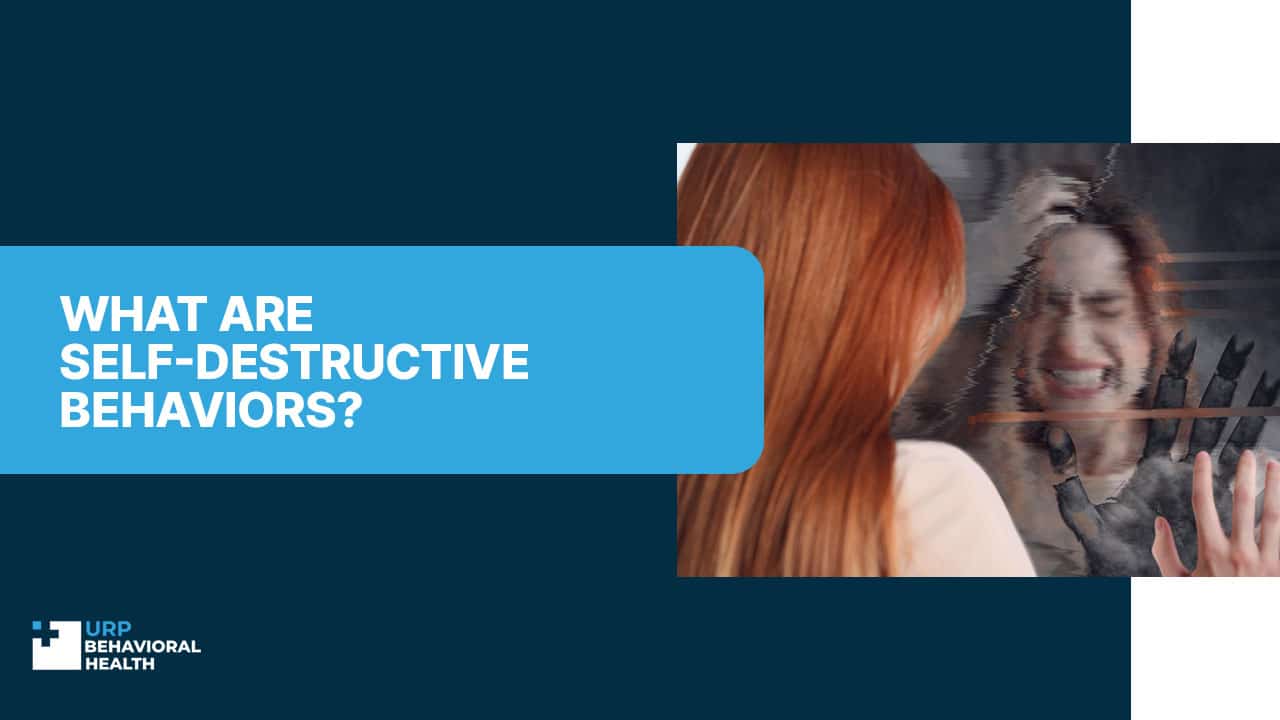
What Are Self-Destructive Behaviors?
Self-destructive actions can wreak havoc in one’s life, but stopping persistent behaviors can be tough and often requires expert assistance. What is the definition of self destructive behaviors? How do they reveal in everyday life, and how can you break the cycle? Let’s discover what indicates the presence of destructive behavior, be it recurrent and severe or more unapparent.
Definition of Self Destructive Behavior
Self-destructive behavior is any action aimed to cause harm to your emotional, mental, or physical welfare [1]. It encompasses a wide range of self-inflicted acts, from procrastination and workaholism to taking unreasonable risks and suicidality. They commonly originate from negative thinking patterns and emotions, including low self-worth, despair, and melancholy.
Types of Self Destructive Behavior
A self destructive behavior list can be divided into several categories, but some people may struggle with a combination of harmful demeanors [2].
1. Emotional self-destruction
Flunking to recognize and sustainably exhibit negative and positive feelings can incite health problems and bodily impairment. Destructive behaviors also stem from self-defeating mindsets thriving on a subconscious level.
2. Physical self-harm
This detrimental practice originates from the willingness to manage emotional pain physically. People may deliberately cut or burn their skin, pull out their hair, punch themselves, and commit suicide attempts.
3. Substance abuse
People prone to self-destructive behaviors often perceive drugs, pain meds, and alcohol as efficient means to unveil their pain and flee from negative thoughts or societal pressure. However, it may lead to compulsion called substance abuse and provoke serious problems in health, work, relationships, and budget.
4. Social isolation
Social isolation often indicates serious distress and challenges, making people withdraw from their closest ones, react impulsively, and experience drastic mood shifts. The extent can manifest differently for every person.
Self destructive behavior psychology considers such demeanors either as stress-coping mechanisms or means to retain a comfort zone.
Contact our admissions team now to begin your path toward a brighter future.

Examples of Self Destructive Behavior
Now let’s examine what are some self destructive behaviors:
- Conscious over- or undereating;
- Obsessive gambling;
- Rash driving;
- Reckless sexual demeanor;
- Self-harming actions;
- Sabotaging your objectives;
- Depriving essential medical care;
- Constant procrastination;
- Persevering negative self-talk;
- Neglecting safety precautions;
- Suicidal tendencies.
In the cause of inattention, they can lead to poor physical and emotional outcomes.
Common examples in daily life
Most people accidentally have minute self-destructive behaviors, but they can grow into persistent dangerous habits by multiple repetitions [3]. Examples of self destructive behaviors in day-to-day life include:
- Refusing to fulfill commitments;
- Adjusting your demeanor or views to content others;
- Estranging other people;
- Passive-aggressiveness;
- Chronic self-pity;
- Discrediting oneself for being insufficiently good-looking, brainy, or productive.
Even if you perceive self-destructive behavior as a fleeting distraction from uncomfortable emotions, negative thinking patterns can eventually form a base for clinical mental disorders like depression. It’s vital to learn healthier self-help skills and work on emotional surveillance and mindfulness.
Self destructive behavior examples in relationships
In relationships, such a behavior can manifest as:
- Sabotaging relationships by suppressing a partner with envy, greed, manipulations, rage, etc.
- Remaining in abusive relationships.
People may choose to behave this way when they feel unworthy of acceptance, compassion, and love.
Causes of Self Destructive Behavior
Self-destructive behavior usually starts in the teenage years, but its roots can spring from early childhood [4].
Psychological factors
People with traumatic experiences or mental disorders are at risk of self-destructive behaviors. If it is coupled with low self-assurance and poor emotional management, an individual may yearn to release their feelings destructively. However, such a sense of control is deceptive, rather a mold of self-punishment and conveying their pain to other people.
Environmental influences
Self-destructive behavior is oftentimes a marker of previous emotional, physical, or sexual abuse. People with friends predisposed to self-harm may fall under the influence and try it themselves. Social isolation also makes a contribution to engaging in self-destructive behavior.
Impact on Mental Health
Self-destructive behaviors don’t pass by themselves and can result in forthcoming distress and negative consequences [5].
Connection to anxiety and depression
Specific mental health conditions, including anxiety disorder and depression, can make a person feel as if life is eluding from their hands. They may discern hazardous deeds as a means to gain control over their lives. Since depression is associated with emotional numbness, people may self-harm to feel something or punish themselves for mistakes.
Long-term effects on well-being
The most evident impacts of self-destructive behavior are traced from the physical perspective. Reckless demeanor can cause unsightly scarring, injuries, sexually transmitted ailments, and a number of diseases like hepatitis, liver failure, and HIV as a result of substance abuse. In addition, a person can develop problems in the financial sphere, career, social interactions, and relationships.
Our team will verify your insurance and design a plan tailored to your needs.

How to Address Self Destructive Behaviors
Lots of people have trouble admitting their harmful demeanor, so they may strive to conceal it from others. However, it’s crucial to seek help from a mental health professional to break a vicious cycle.
Seeking professional support
An experienced therapist will compile a comprehensive overview of your symptoms, history, and concerns to come up with a precise diagnosis and customized treatment plan. The recovery commonly depends on the condition’s severity.
However, doctors can prescribe relative meds to alleviate the symptoms of anxiety, depression, and other clinical mental disorders. Mild or moderate cases can be approached by individual psychotherapy.
Self-help strategies
Before you a , it’s vital to address a mental health expert for a substantial evaluation of your psychological state. The common self-support techniques include:
- Detecting your self-destructive tendencies.
- Practicing mindfulness techniques.
- Taking care of your physical well-being.
- Being kind to yourself to interrupt unhealthy patterns.
- Keeping a self-reflective journal.
Overcoming self-destructive behavior is challenging, but professional help can help you identify triggers, reframe negative beliefs, and pick healthy alternatives to your destructive habits. Turning to comprehensive support can help you manage self-destructive tendencies and move on with your recovery.
Reach out today and let us create a treatment plan designed around your needs.

References:
- Patricia K. Kerig. Self‐Destructive Behavior. November 2017. Link: https://www.researchgate.net/publication/321166827_Self-Destructive_Behavior. Access date: July 5, 2025.
- Eve B. Carlson et al. Development and Initial Validation of the Structured Interview for Self-Destructive Behaviors. 2013 May. Link: https://pmc.ncbi.nlm.nih.gov/articles/PMC3656652/. Access date: July 5, 2025.
- Konstantinos Tsirigotis, Joanna Łuczak. Manifestations of Indirect Self-Destructiveness and Dimensions of Emotional Intelligence. 2015 Oct. Link: https://pmc.ncbi.nlm.nih.gov/articles/PMC4945676/. Access date: July 5, 2025.
- A. van der Kolk, J.C. Perry, J.L. Herman. Childhood origins of self-destructive behavior. 1991 Dec. Link: https://pubmed.ncbi.nlm.nih.gov/1957928/. Access date: July 5, 2025.
- Lachlan Gilbert. Research sheds new light on self-destructive behaviour. Apr 2023. Link: https://www.unsw.edu.au/newsroom/news/2023/04/research-sheds-new-light-on-self-destructive-behaviour. Access date: July 6, 2025.
- Brian Daniel Smith. Self-Mutilation and Pharmacotherapy. Psychiatry (Edgmont). 2005 Oct; 2(10): 28–37. Link: https://pmc.ncbi.nlm.nih.gov/articles/PMC2993516/. Access date: July 6, 2025.
















